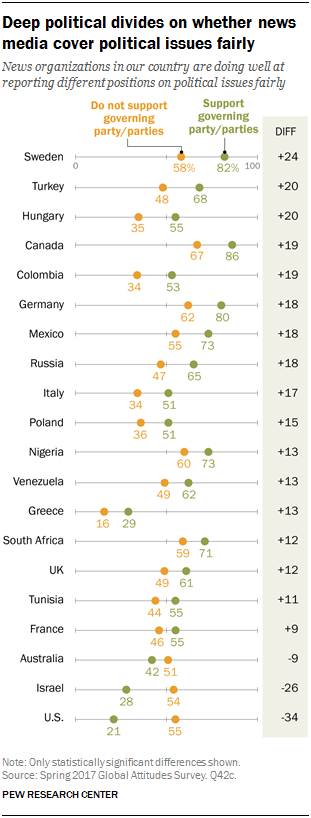Partisanship and Media Satisfaction: International Perspectives
Pew reports:
Within countries, political identification tends to be the strongest divider of media attitudes, more so than education, age or gender.
Political party systems vary considerably across countries, but one consistent measure for comparing political divides is support for the governing party or parties. Individuals who identify with the governing party or parties are categorized as supporters, everyone else as nonsupporters. In the U.S., this means that people who identify with the Republican Party, which currently controls all branches of the federal government, are considered governing party supporters. People who identify with the Democratic Party, say they are independent, identify with some other party or do not identify with any political party are categorized as nonsupporters. (For more details on the categorization, please see Appendix B.)
Using this approach, large gaps in ratings of the media emerge between governing party supporters and nonsupporters. On the question of whether their news media cover political issues fairly, for example, partisan differences appear in 20 of the 38 countries surveyed. In five countries, the gap is at least 20 percentage points, with the largest by far in the U.S. at 34 percentage points. The next highest partisan gap is in Israel, with a 26-point difference.
The U.S. is also one of only a few countries where governing party supporters are lesssatisfied with their news media than are nonsupporters. In most countries, people who support the political party currently in power are more satisfied with the performance of their news media than those who do not support the governing party. For example, in Sweden, the Social Democratic Party and the Green Party are the two parties that currently form the governing coalition in the country. About eight-in-ten Swedes (82%) who identify with these two parties say their news media do a good job of covering political issues fairly. Just 58% of Swedes who do not identify with these two parties agree.

